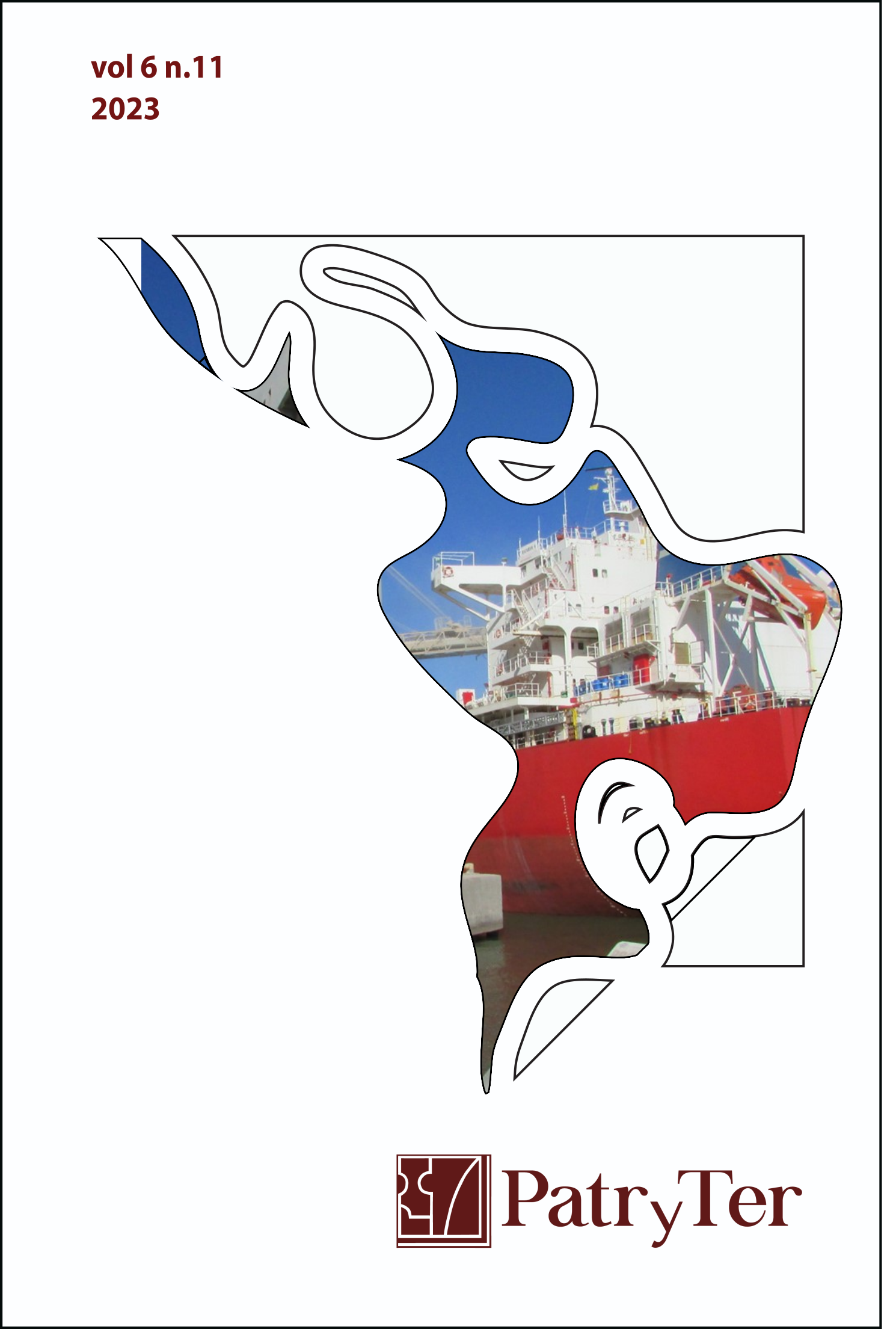Interview and tribute to Roberto Bustos Cara. Geography in Argentina and Bahía Blanca
DOI:
https://doi.org/10.26512/patryter.v6i11.47243Keywords:
Interview. tribute. Roberto Bustos Face. Argentine geography.Abstract
This interview integrates vol. 6, no. 11 of PatryTer, which pays tribute to Professor Roberto Bustos Cara for his dedication and contribution to Geography since 1966, the year he entered the career at the National University of Cuyo, and since 1981, more than four decades walking together with the Department of Geography and Tourism of the National University of the South and other Argentine institutions. Roberto Bustos Cara was born in San Rafael, Mendoza (Argentina), in 1947, the son of Nicolás Bustos Dávila and Dolores Cara. He lived in the south of the Province of Mendoza and then in the city of Mendoza, until he entered the degree in Geography, in 1966, in a land of wine production and Andean mountain landscapes. Bustos Cara obtained a degree in Geography in December 1972 (from the National University of Cuyo, Argentina), a master's degree in Geography in January 1975 and a doctorate in Geography in February 1977, both from the University of Bordeaux-III, France. The most valuable thing to be recorded is that this issue of PatryTer is dedicated to Professor Roberto Bustos Cara for his experience, enthusiasm and the person he is, for what he transmits and inspires everyone around him. The cover of this vol. 6., no. 11 of PatryTer contains a photograph of the Port of Bahía Blanca, a spatial reference in Argentine and personal history of our interviewee and honoree.
Downloads
References
Almeida, N., & Oliveira Faria, M. (2021). Entrevista a Milton Santos, una mirada a los 70 (25 años después). PatryTer, 4(8), 1–10. https://doi.org/10.26512/patryter.v4i8.38283
Bustos Cara, R. (2001). Evaluación de los estudios de posgrado en Argentina. Experiencias, dificultades y perspectivas. Red interdepartamental de Geografía de Universidades Nacionales. Neuquén.
Bustos Cara, R. (2009). Por una Geografía de la acción territorial. Propuesta de un marco teórico para interacción interdisciplinaria. En: Amália Inés Lemos & Emerson Galvani (Eds.). Geografia, tradições e perspectivas: interdisciplinaridade, meio ambiente e representações (pp. 49-68). Buenos Aires: CLACSO; São Paulo: Expressão Popular.
Bustos Cara, R. (1977). Le massif de lAconcagua. Vallée du Río Vacas et Río Horcones dans le haut bassin du Río Mendoza. República de Argentina. Etude géomorphologique. 1977. 245 pág. Gráficos, mapas y cartas. Thése presentée a L'Universite de Bourdeaux III pour la obtention du doctorat de 3eme cycle.
Bustos Cara, R. (2002). Los sistemas territoriales: los procesos de estructuración y desestructuración en Argentina. Anales de Geografía Universidad Complutense, (22), 113-129.
Bustos Cara, R. (2000). Territorio innovación y gobernabilidad. Las mediaciones territoriales del desarrollo local. (Homenaje Dr. Milton Santos). Revista Universitaria de Geografía, 9(2).
Christophe, A., Sassone, S. & Bustos Cara. (2018). Patrimonialización del pasado francés en la pequeña ciudad pampeana de Pigué: un recurso para la identidad y el desarrollo local. Revista Universitaria de Geografía, 27(2).
Costa, E. B. da. (2022). Entrevista y homenaje a Francisco Capuano Scarlato. Geografía y la vida en la metrópolis. PatryTer, 5(10), 5–17. https://doi.org/10.26512/patryter.v5i10.44315
Martins Fonseca, V., & Bustos Cara, R. (2021). Patrimonialización de Áreas Naturales - prácticas vulnerables en las Reservas de Biosfera de Argentina y Brasil. PatryTer, 4(7), 44–62. https://doi.org/10.26512/patryter.v4i7.28480
Muñoz Marcillo, J., Gentili, J. & Bustos Cara, R. (2020). Uso agrícola del suelo y demanda de agua para riego en la cuenca del río Vinces (Ecuador) durante el período 1990-2014. Investigaciones Geográficas, 59, 59-72. https://doi.org/10.5354/0719-5370.2020.56958
Souza, M. A. A. de, & Costa, E. B. da. (2022). De tempos e ritmos, homenagem a Carlos Augusto Figueiredo Monteiro - geógrafo brasileiro. PatryTer, 5(9), 5–9. https://doi.org/10.26512/patryter.v5i9.40528
Downloads
Published
Issue
Section
License
Copyright (c) 2023 PatryTer

This work is licensed under a Creative Commons Attribution-NonCommercial-NoDerivatives 4.0 International License.
Please be advised that Revista Patryter is licensed under a Creative Commons Attribution-NonCommercial-NoDerivatives 4.0 International License (CC BY-NC-ND 4.0) https://creativecommons.org/licenses/by-nc-nd/4.0/deed.en
Authors who publish in the PatryTer Magazine agree to the following terms:
- Authors retain the copyright and grant the journal the right of first publication, the work being simultaneously licensed under the Creative Commons Attribution-NonCommercial-NoDerivatives 4.0 International License (CC BY-NC-ND 4.0) which allows the sharing of the work with recognition of the authorship of the work and initial publication in this journal.
- The contribution is original and unpublished and is not being evaluated for publication by another journal. When submitting the article, authors should attach as a supplementary document a Letter addressed to the PatryTer's Editor, indicating the academic merits of the submitted work (relevance, originality and origin of the article, that is, from what type of research]. This letter must be signed by all authors.
- Authors assign the copyright of the work that they present to the Editorial Board of PatryTer Magazine, which may serve the article in the PatryTer Magazine and in public and private databases in Brazil and abroad.
- Authors declare that they are fully responsible for the entire contents of the contribution that they submit to the Editorial Board of PatryTer Magazine.
- Authors declare that there is no conflict of interest that could interfere in the impartiality of the scientific papers submitted to the PatryTer Magazine Editorial Board.
- Authors are authorized to take additional contracts separately, for non-exclusive distribution of the version of the work published in this journal (eg publish in institutional repository or as a book chapter), with acknowledgment of authorship and initial publication in this journal.
Authors are allowed and encouraged to publish and distribute their work online (eg in institutional repositories or on their personal page) at any point before or during the editorial process, as this can generate productive changes as well as increase the impact and the citation of the published work (See The Effect of Free Access).



